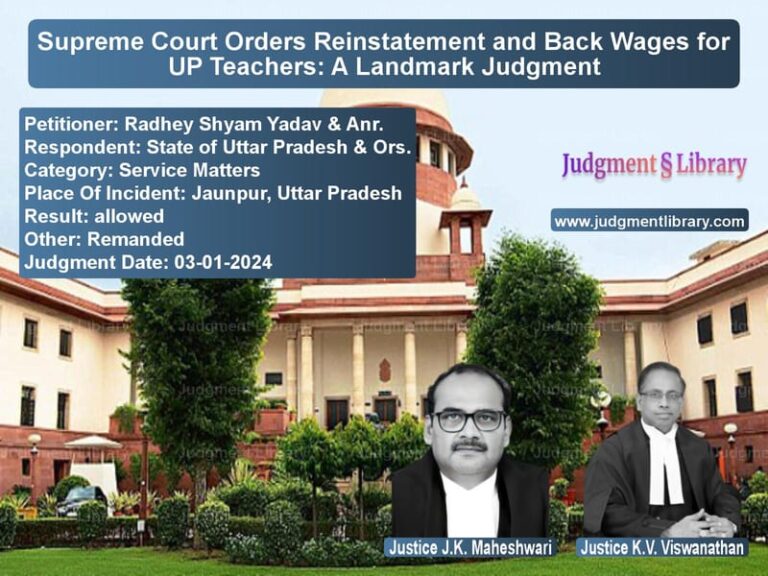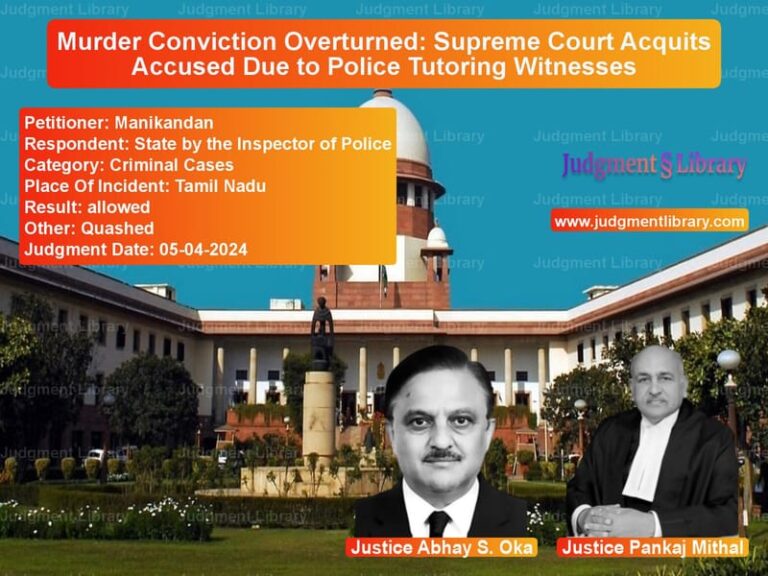Criminalization of Politics: Supreme Court Issues Strong Directives to Political Parties
The case of Brajesh Singh vs. Sunil Arora & Ors. arose from a contempt petition concerning the non-compliance of Supreme Court directives regarding the disclosure of criminal antecedents of election candidates. This case was pivotal in addressing the increasing criminalization of politics in India and the failure of political parties to adhere to the Court’s guidelines for ensuring transparency in electoral processes.
Background of the Case
The petitioner, Brajesh Singh, an advocate registered with the Bar Council of Delhi, filed a contempt petition against the Election Commission of India (ECI) and various political parties. The petition alleged that despite the Supreme Court’s previous directives in Public Interest Foundation & Ors. v. Union of India and the subsequent order in Rambabu Singh Thakur v. Sunil Arora & Ors., political parties had failed to disclose criminal records of their candidates in the 2020 Bihar Legislative Assembly elections.
The Supreme Court, in its February 13, 2020 order, had made it mandatory for political parties to publish details of candidates’ criminal records on their websites, social media platforms, and in newspapers. The order also required parties to provide justifications for selecting candidates with criminal backgrounds over those without.
Arguments by the Petitioner
- The petitioner contended that political parties had blatantly disregarded the Court’s order by either failing to publish the required information or providing vague, insufficient justifications for fielding candidates with criminal records.
- “Despite the clear directives of the Supreme Court, political parties have continued to nominate individuals with serious criminal charges without adequate explanation,” the petitioner argued.
- The failure to adhere to the Court’s order undermined democratic principles and deprived voters of the information necessary to make informed electoral choices.
Arguments by the Respondents
- The Election Commission of India (ECI) maintained that it had issued multiple directives to political parties to comply with the Supreme Court’s order.
- “The Commission ensured that all political parties were informed of their obligation to disclose criminal records and provide justifications for their candidate selections,” the ECI stated.
- Political parties, in their defense, claimed that they had published the necessary details but faced practical challenges in implementing the order, including time constraints and bureaucratic hurdles.
Supreme Court’s Observations
The Supreme Court, after examining the evidence, found that several political parties had either failed to comply with the order or had done so in a perfunctory manner. It noted the following key issues:
1. Failure to Publish Criminal Records
- The Court found that only eight of the ten recognized political parties contesting the Bihar elections had submitted information about candidates with criminal records.
- “Two parties, namely the Communist Party of India (Marxist) and the Nationalist Congress Party, failed to furnish the requisite information,” the Court observed.
2. Vague and Insufficient Justifications
- Many parties provided justifications based solely on “winnability”—a factor explicitly rejected by the Supreme Court as a valid reason for fielding candidates with criminal backgrounds.
- “Merely citing ‘winnability’ as a reason for selecting candidates with serious criminal charges is in direct violation of our order,” the Court stated.
3. Increase in Candidates with Criminal Backgrounds
- The Court noted with concern that the number of candidates with criminal records had increased over successive elections.
- “In 2004, 24% of elected MPs had criminal cases pending against them. By 2019, this number had risen to 43%,” the Court pointed out.
Judgment and Directives
In response to these findings, the Supreme Court issued a set of stringent directives:
- Political parties must prominently display criminal records of candidates on their websites’ homepages under a dedicated section titled “Candidates with Criminal Antecedents.”
- The Election Commission must develop a mobile application allowing voters to access candidate criminal records easily.
- “The ECI shall carry out an extensive awareness campaign across social media, newspapers, and television to inform voters about their right to know a candidate’s criminal background,” the Court ordered.
- Political parties found to be non-compliant will be subjected to contempt proceedings, and fines will be imposed.
- “The failure to comply with these directives shall be treated as a serious offense, and repeated violations will lead to stricter sanctions,” the Court warned.
Conclusion
The Supreme Court’s ruling is a landmark step toward curbing the criminalization of politics in India. By holding political parties accountable and ensuring transparency, the Court has reaffirmed the importance of clean electoral processes. The judgment serves as a warning to political parties that non-compliance with legal directives will not be tolerated and that the fundamental right of voters to make informed choices must be upheld.
Read also: https://judgmentlibrary.com/supreme-court-upholds-electoral-bonds-scheme-amid-transparency-concerns/
Petitioner Name: Brajesh Singh.Respondent Name: Sunil Arora & Ors..Judgment By: Justice Rohinton Fali Nariman, Justice B.R. Gavai.Place Of Incident: Bihar.Judgment Date: 10-08-2021.
Don’t miss out on the full details! Download the complete judgment in PDF format below and gain valuable insights instantly!
Download Judgment: brajesh-singh-vs-sunil-arora-&-ors.-supreme-court-of-india-judgment-dated-10-08-2021.pdf
Directly Download Judgment: Directly download this Judgment
See all petitions in Fundamental Rights
See all petitions in Public Interest Litigation
See all petitions in Legislative Powers
See all petitions in Judgment by Rohinton Fali Nariman
See all petitions in Judgment by B R Gavai
See all petitions in allowed
See all petitions in Modified
See all petitions in supreme court of India judgments August 2021
See all petitions in 2021 judgments
See all posts in Election and Political Cases Category
See all allowed petitions in Election and Political Cases Category
See all Dismissed petitions in Election and Political Cases Category
See all partially allowed petitions in Election and Political Cases Category







